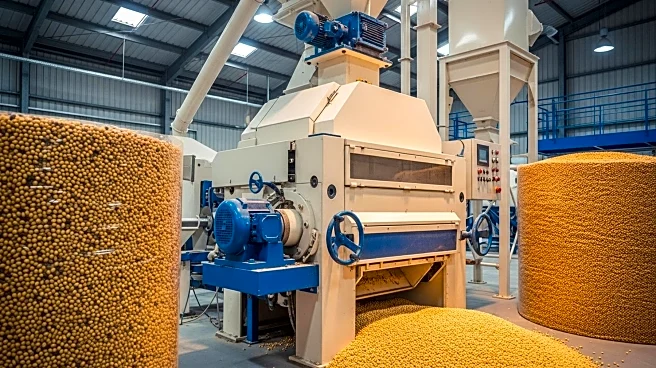What's Happening?
President Trump's trade war with China has significantly affected Argentina's soy crushing industry, despite a surge in soybean exports. The conflict has led to increased exports of raw soybeans to China, causing a slowdown in supply to local processors. This situation has resulted in idle capacity at Argentina's crushing facilities, which process soybeans into meal and oil for export. According to Gustavo Idigoras, president of the CIARA-CEC grain exporters and processors chamber, the trade war has not benefited Argentina but rather harmed its oilseed industry, leading to fewer jobs and lower export value. The U.S. soybean surplus has also allowed U.S. soymeal to compete aggressively with Argentina's products in Southeast Asia.
Why It's Important?
The trade war initiated by President Trump has broader implications for global agricultural markets and economies. Argentina's soy crushing industry, a significant sector for its economy, faces challenges due to the shift in trade dynamics. The increased demand from China for raw soybeans has led to a paradoxical situation where export success does not translate into domestic industry growth. This development highlights the interconnectedness of global trade policies and their impact on local economies. The competition from U.S. soymeal further complicates Argentina's position in the market, potentially affecting its economic stability and employment rates in the agricultural sector.
What's Next?
The future of Argentina's soybean exports is uncertain and largely dependent on the ongoing trade negotiations between China and the United States. The current trade waiver between the two countries is set to expire in November, which could lead to changes in trade policies and affect Argentina's export dynamics. Industry leaders are closely monitoring these developments, as any shifts could have significant consequences for Argentina's agricultural sector and its economic prospects. The situation underscores the need for strategic planning and adaptation in response to international trade policies.
Beyond the Headlines
The trade war's impact on Argentina's soy industry raises ethical and economic questions about the consequences of international trade conflicts. The reliance on raw exports rather than processed goods may lead to long-term shifts in Argentina's industrial capabilities and employment patterns. Additionally, the competitive pressure from U.S. soymeal highlights the challenges faced by countries in maintaining their market positions amid global trade disputes. These developments may prompt discussions on the need for more sustainable and equitable trade practices.











